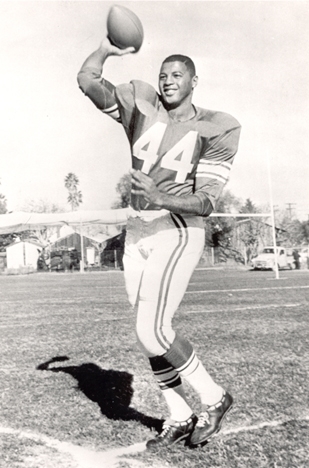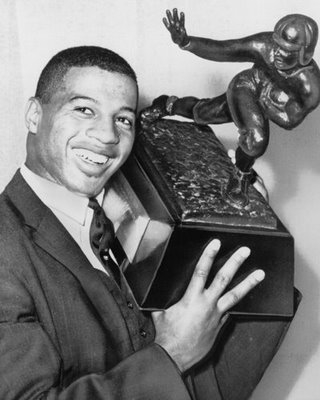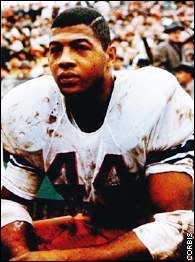 |
| (http://arizonafightnews.com/images2005/FloydLittle/equal-44ed.jpg ()) |
One of the greatest college players, Heisman trophy winner, MVP in three seasons, and he accomplished that in only 23 short, painful years. This was the life of one of the most inspiring players to ever play. His name, short and simple, was Ernest Davis, better known as Ernie, when it was mentioned, it would spark up conversations that would go on for hours about his amazingly difficult, yet successful life. This college All Star, who racked up more stats that would boggle minds of scouts today looking for the next big thing, was bullied, ridiculed, and told he would never accomplish anything. But his abilities to never give up, his courage, and being able to overcome odds are the reasons why so many young athletes look at him as a great hero. Ernie Davis was a remarkable football player who was always expected and told to live the ordinary lifestyle of an African American. He did the exact opposite and never gave up no matter what everyone told him.
|
|
 |
| (http://ahotmama.files.wordpress.com/2011/03/ernie-davis.jpg ()) |
Ernie Davis had to have a lot of courage to get him through the hard times as a kid and an adult. Ernie was growing up in a rough area without parents. With many other factors made it especially hard on him growing up to become what he has become. "Although Ernie's grandfather worked as a coal miner, it was difficult for the grandfather to support the family. He had twelve children of his own, and the family lived in poverty." (Britannica Biographies )Ernie was discriminated for being an African American child. He grew up without parents and also had a severe stuttering problem. Other kids used to beat him up and hated him because of these differences and Ernie would lie awake crying. This evil past followed him into his high school and college career. He had amazing courage to get through this. But he overcame all the hate to become one of the greatest college players ever. Most African Americans wouldn't want that kind of attention in fear of being ridiculed by others in that time. But he had the courage to conquer all the hate and become most likely, the best college player that has ever stepped on the field. Ernie had the courage to stand up to racial intolerance against him and other African Americans. "Although subjected to racial taunting from the earliest days of his career, Davis said after the racially charged Cotton Bowl game against Texas in 1960 that he never gave much thought to such issues. This passivity stood in sharp contrast to the militancy of some of his fellow African-American athletes later in that decade. In 1979 Davis was elected posthumously to the National Football Foundation College Hall of Fame."(Great Athletes Salem Press) He went through life with people teasing him for being the way he was, and it took tremendous courage to be able to withstand it. He was looked at as a force to stop racial intolerance. Since he grew up being afraid, he gained courage and called out those who did things wrong. He is very influential because of this. Ernie knew the dangers of stepping out against this, but he did it anyway and that's why people consider him as a hero.
 |
| (http://i410.photobucket.com/albums/pp189/smoofdogg/0ernie-davis.jpg ()) |
Everyone thought Ernie Davis would never amount to anything, but he overcame the odds to be considered the best college football player by many fans and coaches. When many athletes are criticized, they tend to succumb to the fact that the odds are against them, but not Ernie. He took those odds as a challenge and used them to build his career. "Playing in the National Football League (NFL) had always been Ernie's dream. When he was drafted by the Cleveland Browns and was going to join Jim Brown in the same backfield, his dream seemed to be realized."(American National Biography) No one thought he would be able to get this far, yet he was able to. And now people were comparing him to the legendary Jim Brown. He went through this phase where everyone said he couldn't do this and that, which actually built him up. By trying to tear him down, people were actually helping him shape his career. Leukemia. Even the word makes people cringe, sad, and angry. At a young age Ernie was diagnosed with this horrible disease. "As he was diagnosed with leukemia before the College All-Star Game in July 1962. He underwent a variety of treatments in an attempt to return to football, but they were all unsuccessful; he died in a Cleveland hospital in 1963."(American National Biography) Even with leukemia he tried to overcome the odds and play in the NFL. He played in one game. And that's all he needed to prove everyone wrong. He died at 23, such a young age for such an inspiring and upcoming player who had touched so many people already. People still remember his funeral. He was so well respected and liked that thousands of people attended his funeral, including almost the entire Cleveland Browns football team. There were lines of mourners two blocks long waiting to pay their respects.
As many fans and coaches have seen, Ernie had the abilities to never give up, to use his courage, and was able to overcome odds, which he used to inspire younger kids, build a great career, fight out against racial intolerance, and to be loved by so many. These reasons, or actions, have given life to those who were dead, and courage to those who were meek. He gave everyone such a great inspiration to admire that no one really thought about him being a hero. Well he is a hero, to those that are being criticized, ridiculed, and bullied by others, he is a hero to them.
"Davis, Ernie." Britannica Biographies (2011): 1. MAS Ultra - School Edition. Web. 3 May 2012
Gilbert, Daniel R. "Ernie Davis." American National Biography (2010): 1. Biography Reference Center. Web. 3 May 2012.
Schwartz Stephen and Schwartz Stephen. "Ernie Davis." Great Athletes (Salem Press) (2009): 1. Biography Reference Center. Web. 8 May 2012.
Salem, Press. "Ernie Davis. Great Athletes (Salem Press) (2001): 568. History Reference
Center. Web. 8 May 2012.
Page created on 5/21/2012 12:00:00 AM
Last edited 5/21/2012 12:00:00 AM
